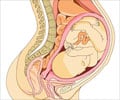A new study shows women who undergo a cesarean section during their first pregnancy are at an increased risk of having a stillborn child down the
A new study shows women who undergo a cesarean section during their first pregnancy are at an increased risk of having a stillborn child down the road.
Researchers are uncertain why the link between C-section delivery and stillbirth exists but say it could be a biological cause.Researchers in Scotland studied data for all second births that took place in the country between 1992 and 1998. They then compared the data to records from the women’s first pregnancies and to information provided in the Scottish Stillbirth and Infant Death Enquiry to determine if there was a link between having a C-section and having a stillborn child.
Results of the study show 68 stillbirths were reported in less than 17,760 women who previously delivered by C-section. There were 244 stillbirths reported in the more than 102,870 women who delivered vaginally. Women who had previously delivered by C-section were older, shorter, and less likely to smoke than those who delivered vaginally.
They were also more likely to have had complications during their pregnancy. Researchers say the absolute risk of unexplained stillbirth at or after 39 weeks gestation was 1.1 per 1000 women who had had a previous cesarean section and 0.5 per 1000 in those who had not.
Researchers say It is possible that intentional or inadvertent ligation of major uterine vessels at the time of first caesarean section could affect uterine blood flow in future pregnancies.






